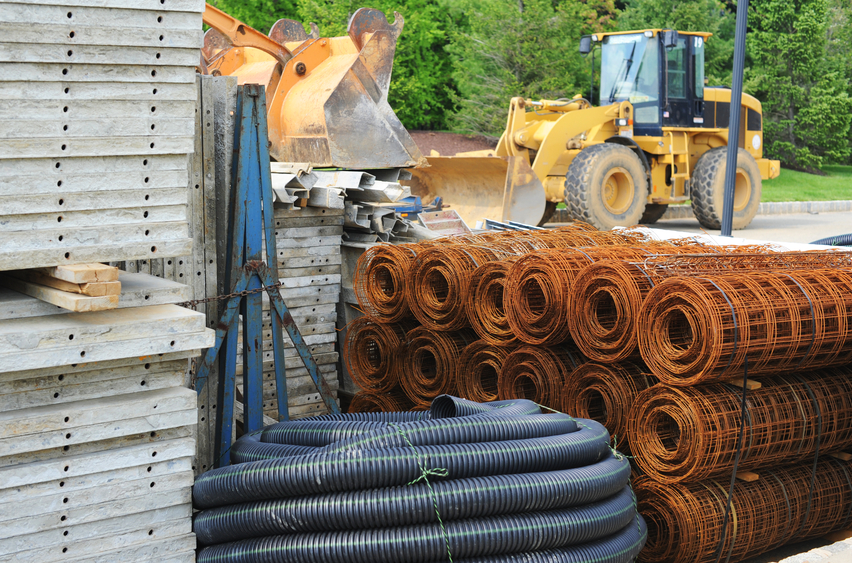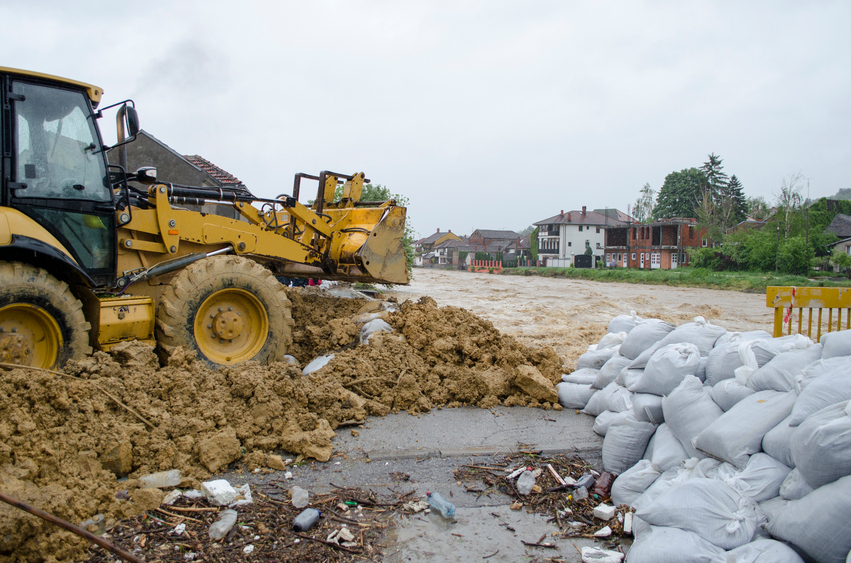Structural Engineering 12 PDH Discount Package 3
Openings in Foundation Walls and Walls of Enclosures (S03-015)
Structural Design of Concrete Lined Flood Control Channels (S03-001)
Substantially Improved/Substantially Damaged Buildings (S02-026)
Wet Floodproofing Requirements (S02-014)

This online engineering PDH course provides guidance for the design, selection, and review of FEMA flood damage resistant material requirements.
The national flood insurance program (NFIP) has a primary goal of protecting buildings from flood damage. In order to meet this goal, the federal emergency management agency (FEMA) has specific design requirements for new construction, as well as substantially damaged or substantially improved structures within special flood hazard areas. One key component of minimizing damage during the base flood is the use of flood damage resistant materials.
FEMA has established a methodology to evaluate and select materials that will lower a buildings vulnerability to flood damage. Flood resistant materials are used to reduce damages resulting from prolonged contact of flood waters. All building materials that are below the base flood must meet certain criteria in order to be in compliance with the NFIP.
This 2 PDH online course is intended for practicing engineers, contractors, developers, governmental agencies, regulators, and all other personnel involved with the design, installation, and maintenance of flood damage resistant materials.
This PE continuing education course is intended to provide you with the following specific knowledge and skills:
- Understanding the definition and importance of flood damage resistant materials
- Familiarizing with the selection criteria for flood damage resistant materials
- Learning how flood damage resistant materials affect flood insurance rates
- Learning how to identify and select flood resistant materials
In this professional engineering CEU course, you need to review FEMA publication titled, "Flood Damage-Resistant Materials Requirements" (Technical Bulletin 2, August 2008).
Upon successful completion of the quiz, print your Certificate of Completion instantly. (Note: if you are paying by check or money order, you will be able to print it after we receive your payment.) For your convenience, we will also email it to you. Please note that you can log in to your account at any time to access and print your Certificate of Completion.

This online engineering PDH course provides guidance for the design, selection, and review of FEMA compliant flood openings.
The national flood insurance program (NFIP) has a primary goal of protecting buildings from flood damage. In order to meet this goal, the federal emergency management agency (FEMA) has specific design requirements for new construction, as well as substantially damaged or substantially improved structures within special flood hazard areas. One key component of minimizing damage during the base flood is the use of openings in foundation and enclosure walls in order to prevent structural collapse due to hydrostatic forces.
FEMA has established a methodology to design these flood openings that will lower a buildings vulnerability to flood damage. Flood openings perform the critical task of equalizing water levels on the inside and outside of walls. This results in a reduction in the potential for differential pressure against walls that could result in failure. All walls and enclosed areas below the base flood must meet certain criteria in order to be in compliance with the NFIP.
This 3 PDH online course is intended for practicing engineers, contractors, developers, governmental agencies, regulators, and all other personnel involved with the design, permitting and approval of structures near the floodplain.
This PE continuing education course is intended to provide you with the following specific knowledge and skills:
- Understanding the importance of flood openings
- Familiarizing with the requirements for flood openings
- Learning how flood openings affect flood insurance rates
- Learning how to identify, select, size and locate flood openings
In this professional engineering CEU course, you need to review FEMA publication titled, "Openings in Foundation Walls and Walls Of Enclosures" (Technical Bulletin 1, August 2008).
Upon successful completion of the quiz, print your Certificate of Completion instantly. (Note: if you are paying by check or money order, you will be able to print it after we receive your payment.) For your convenience, we will also email it to you. Please note that you can log in to your account at any time to access and print your Certificate of Completion.

This online engineering PDH course provides guidance for the design of reinforced, concrete lined flood control trapezoidal and rectangular channels which convey rapid and tranquil storm water flows to prevent flooding. This course also presents provisions for coordinating the disciplines involved in the design of channels, selecting channel type, and identifying the critical aspects of designs which require quality assurance inspection during construction.
Channel design involves determining the overall channel configuration including appurtenant structures, designing reinforced concrete structures and pavement or concrete lining, determining type and location of joints, designing sub-drainage systems, and designing appropriate safety features.
This 3 PDH online course is applicable to civil, structural and geotechnical engineers, as well as design and construction personnel involved with the planning and design of concrete lined flood control channels.
This PE continuing education course is intended to provide you with the following specific knowledge and skills:
- Learning the different types of trapezoidal and rectangular channels
- Selecting the appropriate channel type
- Learning the different types of retaining wall structures
- Learning the different types of structural joints and anchorages
- Understanding the constructability of paving slabs on sloped sides of channels
- Understanding the constructability of the drainage layer
- Maintaining and protecting channel structures
In this professional engineering CEU course, you need to review the US Corps of Engineers Publication EM 1110-2-2007, "Structural Design of Concrete Lined Flood Control Channels".
Upon successful completion of the quiz, print your Certificate of Completion instantly. (Note: if you are paying by check or money order, you will be able to print it after we receive your payment.) For your convenience, we will also email it to you. Please note that you can log in to your account at any time to access and print your Certificate of Completion.

This online engineering PDH course outlines many of the ways to determine if a building has been substantially damaged or substantially improved. This course also outlines how to determine the cost of improvements/repairs in difficult situations such as dealing with donated materials and labor.
The national flood insurance program (NFIP) has a primary goal of protecting buildings from flood damage. In order to meet this goal, the federal emergency management agency (FEMA) has specific design requirements for new construction, as well as substantially damaged or substantially improved structures within special flood hazard areas. FEMA has set requirements meant to balance the needs for maintaining and improving existing structures while managing the risk associated with allowing improvements in the floodplain. FEMA has established a methodology to evaluate when improvements to buildings trigger the requirement to bring the entire structure into compliance with all requirements of the NFIP. FEMA requires that the value of the structure and improvements be calculated in an equitable consistent manner.
This 2 PDH online course is intended for practicing civil, structural and geotechnical engineers, contractors, developers, governmental agencies, regulators, and all other personnel involved with the permitting, design, and approval of improvements to structures in the floodplain.
This PE continuing education course is intended to provide you with the following specific knowledge and skills:
- Knowing why the substantial damage threshold has been set at 50%
- Learning how to calculate the value of a structure and the cost of improvements
- Understanding how substantial damage requirements are used in a disaster
Upon successful completion of the quiz, print your Certificate of Completion instantly. (Note: if you are paying by check or money order, you will be able to print it after we receive your payment.) For your convenience, we will also email it to you. Please note that you can log in to your account at any time to access and print your Certificate of Completion.

This online engineering PDH course provides guidance for the design, selection, and review of wet floodproofed structures.
The national flood insurance program (NFIP) has a primary goal of protecting buildings from flood damage. In order to meet this goal, the federal emergency management agency (FEMA) has specific design requirements for new construction, as well as substantially damaged or substantially improved structures within special flood hazard areas. One potential way to minimize flood damage to certain types of structures is the proper use of wet floodproofing.
FEMA has established a methodology to evaluate and select when wet floodproofing may be utilized and design criteria that will lower a buildings vulnerability to flood damage when inundated by flood waters. Flood resistant materials are used to reduce damages resulting from prolonged contact of flood waters. All building materials that are below the base flood must meet certain criteria in order to be in compliance with the NFIP.
This 2 PDH online course is intended for practicing civil, structural and geotechnical engineers, contractors, developers, governmental agencies, regulators, and all other personnel involved with the design, installation, and maintenance of wet floodproofing materials.
This PE continuing education course is intended to provide you with the following specific knowledge and skills:
- Familiarizing with the requirements of wet floodproofing
- Learning about the situations where wet floodproofing may be utilized
- Understanding the flood insurance implications of wet floodproofing
- Identifying and selecting building components that are properly wet floodproofed
In this professional engineering CEU course, you need to review FEMA Publication titled, "Wet Floodproofing Requirements" (Technical Bulletin 7, December 1993).
Upon successful completion of the quiz, print your Certificate of Completion instantly. (Note: if you are paying by check or money order, you will be able to print it after we receive your payment.) For your convenience, we will also email it to you. Please note that you can log in to your account at any time to access and print your Certificate of Completion.